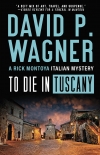To Die in Tuscany, David Wagner [best novel books to read .TXT] 📗

- Author: David Wagner
Book online «To Die in Tuscany, David Wagner [best novel books to read .TXT] 📗». Author David Wagner
DiMaio looked at Rick and Betta. “I think I can find you a room somewhere else.”
* * *
The botany department of the university was conveniently located just behind the botanical gardens. Windows on the lower two floors of the building looked across the narrow street at the walls of the gardens, not an especially picturesque view, but not one unusual for Urbino inside the city walls, where buildings were stuffed together. When marauders menaced in the old days it was better to be living safely in cramped quarters than out in the countryside, despite less than ideal sanitary conditions. With the advent of modern indoor plumbing, heating, and air-conditioning, these buildings became fashionable, and had the university not purchased this one years earlier, it might have been out of its price range.
The office of Professor Salvatore Florio had the best view in the department. Through two small windows it looked past the street and over the wall to the treetops of the botanical gardens. For Florio, however, catching the sunlight was more important than getting the full view. The windowsills were lined with pots, as was the floor below where plants spread out into corners, with lamps supplementing the natural light. The three outer edges of his desk bore a prickly wall of cacti, some more menacing than others. It was this sea of greens and browns that greeted DiMaio as he entered the office. His first thought was to wonder how long it took to water the pots every day. It flashed through his head that Florio could easily blend in among the trees across the street. He was long-necked and awkwardly tall, wore a loose-fitting brown wool suit, and had a mop of unkempt hair that constantly needed to be pushed aside so he could see through his frameless glasses.
The professor motioned to the lone empty chair. “Please sit down, Inspector. I hope I can be of some assistance in your investigation. As you might imagine, the death of Signor Somonte was a great shock to those of us connected to the gardens. He was a generous benefactor.”
Florio’s high-pitched voice went well with his body type. DiMaio carefully maneuvered his way between pots, looked down to be sure the seat was plant-free, and eased himself into its cushion. “Thank you, Professor. Can I begin by asking when Somonte became involved with the gardens?” He moved his head slightly to see around a rabbit-ear cactus that partially blocked his view of Florio.
“Certainly. It was a few years ago. An Italian friend of his discovered his interest in flora and suggested he visit. Fortunately, I was there that day and we became acquainted. He was impressed with our history—as you may know, the gardens date back to 1806—and also with the plants. He was quite taken with our acrogymnospermae collection, especially a spectacular Encephalartos sclavoi. Botanists come from all over Europe to see it.”
DiMaio had his pen and notebook at the ready but had written nothing. “The plant where his body was found was his donation.”
“Exactly. It and other plants he gave us were formally received about two years ago, in a ceremony conducted by the rector of the university. Perhaps you read about it in the newspaper or saw it on the television news.”
“That was before my time here.” He wrote a few words on his pad. “Who was the person who suggested he visit the gardens that first time?”
Florio rubbed his chin in thought. “Let me think. I believe it was someone from the museum. Vitellozzi? Yes, that’s it, Vitellozzi. I don’t know his first name. Somonte was very much interested in art, Inspector. I’m not sure if you were aware of that. I have a theory about the murder that I thought of this morning. I think—”
“We are aware of his interest in art, Professor. In fact, a piece of art in Somonte’s possession is missing, and possibly that was the reason he was killed.”
Florio’s eyes widened and appeared even wider through the glasses. “I was not aware of that. Goodness me, that does complicate things—and it destroys my theory. You see, Inspector, I am a careful reader of gialli, especially those of the late Andrea Camilleri, so I cannot help but put this murder in the context of others I have read about.”
It was not what DiMaio wanted to hear. He didn’t need the advice from someone who had read a lot of murder mysteries, but he remained polite. “When was the last time you saw Somonte alive?”
Florio swallowed hard, making his Adam’s apple even more prominent. “I did not mention it to you this morning, what with the shock of finding his body, but I saw him yesterday. He came by the gardens, as he always does when he comes to Urbino.”
“Did he seem preoccupied about anything? Was he different from his other visits?”
Florio could not hide his pleasure. “That is a question that Inspector Montalbano often asks witnesses, and I was wondering if you would ask me as well. No, Somonte was the same as ever, very attentive to the plants, asking questions about soil and nutrients. He was very knowledgeable for an amateur botanist.”
DiMaio tapped his pad with the pen. “There is something I neglected to ask this morning. Who has keys to the gardens? I assume you do not leave the gate open after hours.”
The Adam’s apple bobbed once more. “I have one, of course.” He opened the drawer and rifled through its contents before holding up a large, copper key and then putting it back. “Others? Our head gardener, Nino. Two women who collect the entrance fees from visitors and sell postcards. After visiting the gardens, people often pick up a postcard or two to send to friends, but they are mostly the older visitors. Young people just take pictures on their phones. We don’t mind; it still gets the word out about the gardens, and that’s the important





Comments (0)